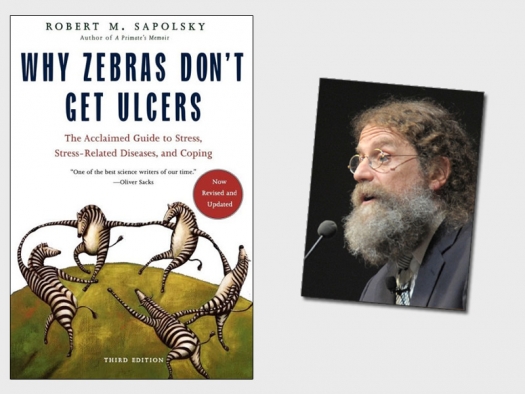Book announcement
RobertSapolskyWhyZebrasDontGetUlcers.jpg

Why Zebras Don't Get Ulcers by Robert M. Sapolsky
Now in a third edition, Why Zebras Don't Get Ulcers by Robert M. Sapolsky, a Stanford University biologist, features new chapters on how stress affects sleep and addiction, as well as new insights into anxiety and personality disorder and the impact of spirituality on managing stress. The book proclaims itself as a "Guide to Stress, Stress-Related Diseases, and Coping."
The title derives from Sapolsky's idea that for animals such as zebras, stress is generally episodic, while for humans, stress is often chronic. Therefore, many wild animals are less susceptible than humans to chronic stress-related disorders such as ulcers, hypertension, decreased neurogenesis and increased hippocampal neuronal atrophy. Chronic stress occurs in some social primates for individuals on the lower side of the social dominance hierarchy. Sapolsky focuses on the effects of glucocorticoids on the human body, stating that such hormones may be useful to animals in the wild escaping their predators, but the effects on humans are much less desirable when secreted at high quantities or over long periods of time,
As Sapolsky explains, most of us do not lie awake at night worrying about whether we have leprosy or malaria. Instead, the diseases we fear-and the ones that plague us now-are illnesses brought on by the slow accumulation of damage, such as heart disease and cancer. When we worry or experience stress, our body turns on the same physiological responses that an animal's does, but we do not resolve conflict through fighting or fleeing. Over time, this activation of a stress response makes us literally sick.
Combining cutting-edge research with a good sense of humor and practical advice, Why Zebras Don't Get Ulcers explains how prolonged stress intensifies and can cause a wide range of physical and mental afflictions, including depression, ulcers, colitis, heart disease, and more. It also provides essential guidance to controlling our stress responses. In today’s environment with pandemics, fear, stress, uncertainty and loneliness, the book is timely and pertinent.
Why Zebras Don’t Get Ulcers is available on Amazon and through other book sellers.


